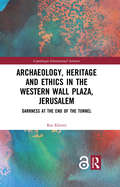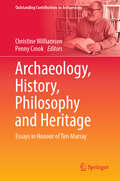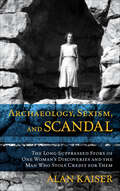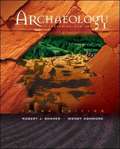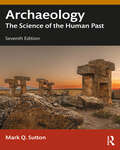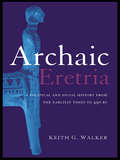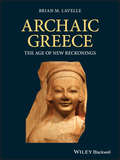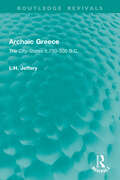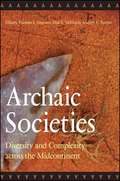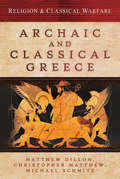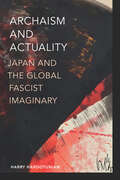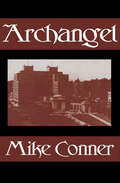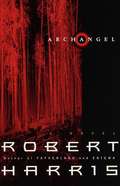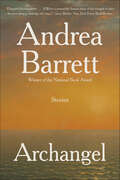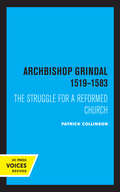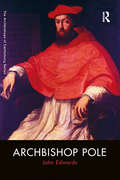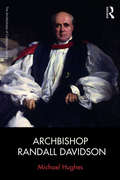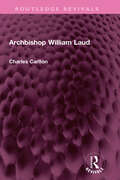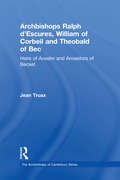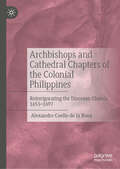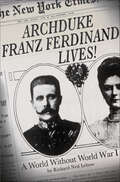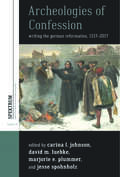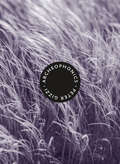- Table View
- List View
Archaeology, Heritage and Ethics in the Western Wall Plaza, Jerusalem: Darkness at the End of the Tunnel
by Raz KletterThis volume is a critical study of recent archaeology in the Western Wall Plaza area, Jerusalem. Considered one of the holiest places on Earth for Jews and Muslims, it is also a place of controversy, where the State marks ‘our’ remains for preservation and adoration and ‘theirs’ for silencing. Based on thousands of documents from the Israel Antiquities Authority and other sources, such as protocols of planning committees, readers can explore for the first time this archaeological ‘heart of darkness’ in East Jerusalem. The book follows a series of unique discoveries, reviewing the approval and execution of development plans and excavations, and the use of the areas once excavation has finished. Who decides what and how to excavate, what to preserve – or ‘remove’? Who pays for the archaeology, for what aims? The professional, scientific archaeology of the past happens now: it modifies the present and is modified by it. This book ‘excavates’ the archaeology of East Jerusalem to reveal its social and political contexts, power structures and ethics. Readers interested in the history, archaeology and politics of the Israeli-Palestinian conflict will find this book useful, as well as scholars and students of the history and ethics of Archaeology, Jerusalem, conservation, nationalism, and heritage.
Archaeology, History, Philosophy and Heritage: Essays in Honour of Tim Murray (Outstanding Contributions to Archaeology)
by Penny Crook Christine WilliamsonThis festschrift volume celebrates Tim Murray&’s significant and wide-ranging contribution to archaeological thought and practice. It includes 27 papers by Tim Murray&’s colleagues, research collaborators and students—former and current. Together these comprise a substantive and reflective contribution to Archaeology, History, Philosophy and Cultural Heritage in Australia, Oceania, China, India, the United Kingdom, Northern Europe, and North America. The collected papers in this volume tie together Murray&’s research into the history (or historiography) of archaeological thought, and his commitment to understanding the material culture of the past to &‘write history&’. They provide a cross-section of philosophical enquiries and substantive research: from epistemological studies of shared lexicons and important debates in the history of archaeological thought, to the minutae of material culture studies. Several papers explcitly and implicitly explore one of Murray&’s great interests: the role of heritage preservation in our exploration of the past, including dedicated tertiary training programs for Indigenous Australians to manage, research and protect their own Country. The book is divided into four parts: History, Archaeology, Philosophy and Heritage, offering an interdisciplinary approach to the study of the past. This volume would be of interest to archaeologists, historians, philosophers of archaeology, and heritage scholars.
Archaeology, Sexism, and Scandal: The Long-Suppressed Story of One Woman's Discoveries and the Man Who Stole Credit for Them
by Alan KaiserA true story of plagiarism, complicity, and a 1930s excavation that &“has the arresting immediacy of investigative journalism&” (The Journal of Hellenic Studies). The 1931 excavation season at Olynthus, Greece, ushered a sea change in how archaeologists study material culture—and was the nexus of one of the most egregious (and underreported) cases of plagiarism in the history of classical archaeology. In this book, Alan Kaiser draws on the private scrapbook that budding archaeologist Mary Ross Ellingson compiled during that dig, as well as her personal correspondence and materials from major university archives, to paint a fascinating picture of gender, power, and archaeology in the early twentieth century. Using Ellingson&’s photographs and letters as a guide, Kaiser brings alive the excavations led by David Robinson and recounts how the unearthing of private homes—rather than public spaces—emerged as a means to examine the day-to-day of ancient life in Greece. But as Archaeology, Sexism, and Scandal clearly demonstrates, a darker story lurks beneath the smiling faces and humorous tales: one in which Robinson stole Ellingson&’s words and insights for his own, and fellow academics looked the other way—denying her the credit she was due for more than eighty years. &“Kaiser&’s exciting and timely volume should force readers to openly confront gender-related biases in science and academia.&” —Library Journal (starred review) &“Important.&” —Publishers Weekly &“Highly recommended.&” —Choic
Archaeology: Discovering Our Past, Third Edition
by Robert J. Sharer Wendy AshmoreThis is the only textbook which is organized to follow the steps of the actual process of archaeological research in order to present the methods and theoretical frameworks of archaeology, from the planning and actual conduct of field research, to the different ways archaeological data is interpreted to produce an understanding of the past. It is also the only such textbook to give the reader a series of firsthand accounts of what its like to do archaeology, written by a variety of practicing archaeologists.
Archaeology: The Science of the Human Past
by Mark Q. SuttonArchaeology: The Science of the Human Past introduces students to the wide-ranging and fascinating world of archaeology and provides them with a comprehensive understanding of fundamental archaeological concepts and methods.The seventh edition keeps pace with the developments in archaeological science with up-to-date information on dating, artifact analyses, and remote sensing. Theoretical developments in power, gender, and cognition are also included. Introducing the key components of archaeology, including sites, artifacts, ecofacts, remote sensing, and excavation, it discusses the ways archaeologists obtain, analyze, and interpret evidence. Varying perspectives are considered to provide holistic coverage of how archaeological techniques and methods are used to formulate and test models of what happened in the past. Cultural resource management and the laws and regulations that deal with archaeology around the world are described. Archaeology is placed in the context of current topics, from environmental problems to issues affecting Indigenous populations.Archaeology: The Science of the Human Past remains an ideal introduction to archaeology by offering students a broad and clear understanding of the theoretical and scientific aspects of archaeology and how various archaeological perspectives and techniques help us comprehend not just the past but the contemporary world as well.
Archaic Eretria: A Political and Social History from the Earliest Times to 490 BC
by Keith G. WalkerThis book presents for the first time a history of Eretria during the Archaic Era, the city's most notable period of political importance and Keith Walker examines all the major elements of the city's success. One of the key factors explored is Eretria's role as a pioneer coloniser in both the Levant and the West - its early Aegaen 'island empire' anticipates that of Athens by more than a century, and Eretrian shipping and trade was similarly widespread. Eretria's major, indeed dominant, role in the events of central Greece in the last half of the sixth century, and in the events of the Ionian Revolt to 490 is clearly demonstrated, and the tyranny of Diagoras (c.538-509), perhaps the golden age of the city, is fully examined. Full documentation of literary, epigraphic and archaeological sources (most of which has previously been inaccessible to an English speaking-audience) is provided, creating a fascinating history and valuable resource for the Greek historian.
Archaic Greece: The Age of New Reckonings
by Brian M. LavelleAn introductory guide to the Archaic period in ancient Greece—the people, their society, and their culture. Excerpts from literary and other texts give voice to the interests, concerns, and emotions of the Archaic Greeks themselves. This book provides a brief but comprehensive introduction to the society and culture of the Archaic period in the Greek world from c. 750 to c. 480 BCE. It focuses on the persistent and often-conflicting themes, topics, and controversies of the Archaic Age (e.g., elite and non-elite, religion and science, tradition and humanism). It seeks to lead the reader to a broader and deeper understanding of the period by placing themes and topics in a mutually supportive contextual network that will underscore their significance. Archaic Greece: The Age of New Reckonings begins with a chapter on how sources for the period are evaluated and deployed, and goes on to offer a concise yet thorough historical overview of the Archaic period. Subsequent chapters cover polis and politics; war and violence; religion; science; philosophy; art; literature; festivals and games; social forces, values, and behaviors; and gender and sex. The book: Offers a novel approach to a very significant period that foregrounds literary evidence and the words voiced by Archaic Greeks, combining scholarship with readability; Conceptualizes Archaic Greek culture and society by focusing substantially on topics that supplement the history of the period; Combines diverse elements of society and culture, including religion, art, literature, games and festivals, gender, sexuality, and politics in order to develop a unique picture of Greece during the Archaic period; Includes a summarizing essay that draws chapters together, emphasizing the implications of their topics and themes. Archaic Greece: The Age of New Reckonings should appeal to college-level instructors as a book to assign to students enrolled in courses involving Archaic Greece and to others interested in this intriguing and pivotal period in ancient Greece.
Archaic Greece: The City-States c.700–500 B.C. (Routledge Revivals)
by L.H. JefferyArchaic Greece (1976) describes the typical polis, and considers in turn each city-state in mainland Greece, the Aegean and the coast of Asia Minor. In detailing its history and local culture, as well as events which had great impact on the period – the reforms of Solon, the expulsion of tyrants – the book shows how each contributed to the structure of Greek society as a whole.
Archaic Societies: Diversity and Complexity Across the Midcontinent
by Thomas E. Emerson Dale L. McElrath Andrew C. FortierSweeping and detailed, this long-awaited volume is an indispensable guide to the Archaic period across the midcontinent. Archaeologists throughout the region share the latest excavation results and analytical perspectives to reveal and reinterpret the worlds of those Native peoples who lived there for some 9,000 years (up to about 3,000 years ago). Of particular concern is the establishment of relative and absolute chronologies for the Archaic period, the relationships between the artifacts left behind and the peoples who made and used them, and the changing interactions between cultures, climate, and landscape. Archaeologists offer useful, up-to-date overviews of Archaic societies, assessment of stratigraphic sequences, and detailed discussions of finds and interpretations from the Mississippi and Ohio river regions and the Great Lakes. Comprehensive and accessible, this landmark book is a must for anyone wanting to understand a crucial but little-understood period in North America s prehistory.
Archaic and Classical Greece
by Michael H. Crawford David WhiteheadThe aim of this book is to collect in one comprehensive volume a representative selection of ancient sources in translation, with commentary, on the history, institutions, society and economy of the Greek world from c. 750 to 338 BC - that is, the period best known and most important for the evolution of the polis, a form of political community which combined the aspects of city and state in a physical and psychological unity unparalleled either before or since. For us, the inheritors of much that the Greeks created, there is an inherent interest in the way in which they organised their society during these centuries. Although this book assumes no knowledge of Greek, the reader is introduced to a range of key Greek words and concepts which offer a direct insight into the mentality, both collective and individual, of the times. The sources themselves (all of which have been translated by the authors) are supported by introductory commentary, notes, bibliographies, chronological tables and maps. All students and teachers of the history of ancient Greece or of classical civilisation generally will find this book an invaluable tool.
Archaic and Classical Greece (Religion & Classical Warfare)
by Christopher Matthew Matthew Dillon Michael SchmitzEssays examining the influence of gods, oracles, and omens in the wars of the Archaic and Classical Greek world.Religion was integral to the conduct of war in the ancient world and the Greeks were certainly no exception. No campaign was undertaken, no battle risked, without first making sacrifice to propitiate the appropriate gods (such as Ares, god of War) or consulting oracles and omens to divine their plans. Yet the link between war and religion is an area that has been regularly overlooked by modern scholars examining the conflicts of these times. This volume addresses that omission by drawing together the work of experts from across the globe. The chapters have been carefully structured by the editors so that this wide array of scholarship combines to give a coherent, comprehensive study of the role of religion in the wars of the Archaic and Classical Greek world.Aspects considered in depth will include: Greek writers on religion and war; declarations of war; fate and predestination, the sphagia and pre-battle sacrifices; omens, oracles and portents, trophies and dedications to cult centers; militarized deities; sacred truces and festivals; oaths and vows; religion & Greek military medicine.Praise for Religion & Classical Warfare: Archaic and Classical Greece“Comprised of ten erudite and impressively informative articles by experts in the field of Greek antiquity. . . . A work of meticulous and detailed scholarship, Religion & Classical Warfare: Archaic and Classical Greece must be considered as a core addition to community, college, and university library Antiquarian Greek History collections and supplemental curriculum studies lists.” —Midwest Book Review
Archaism and Actuality: Japan and the Global Fascist Imaginary (Theory in Forms)
by Harry HarootunianIn Archaism and Actuality eminent Marxist historian Harry Harootunian explores the formation of capitalism and fascism in Japan as a prime example of the uneven development of capitalism. He applies his theorization of subsumption to examine how capitalism integrates and redirects preexisting social, cultural, and economic practices to guide the present. This subsumption leads to a global condition in which states and societies all exist within different stages and manifestations of capitalism. Drawing on Japanese philosophers Miki Kiyoshi and Tosaka Jun, Marxist theory, and Gramsci’s notion of passive revolution, Harootunian shows how the Meiji Restoration of 1868 and its program dedicated to transforming the country into a modern society exemplified a unique path to capitalism. Japan’s capitalist expansion in the nineteenth and twentieth centuries, rise as an imperial power, and subsequent transition to fascism signal a wholly distinct trajectory into modernity that forecloses any notion of a pure or universal development of capitalism. With Archaism and Actuality, Harootunian offers both a retheorization of capitalist development and a reinterpretation of epochal moments in modern Japanese history.
Archangel
by Mike ConnerNebula-award winning author Mike Conner presents a novel about a world that all of us can recognize, a world of what might have been. In Minneapolis in the 1930&’s, the deadly plague that ended the First World War is decimating the population. The only people who seem to be immune to its effects are black people. What does this mean for the future of the city—and of the nation? Young newsman Danny Constantine finds that not everyone is dying from the plague. He has discovered a series of bizarre deaths—murders that look like the work of a vampire. In these times of bad news, his own paper refuses to print the story and Danny must search for the truth on his own, except for a mysterious woman known only as archangel, who always seems to appear when needed most.
Archangel
by Robert HarrisOne night, Kelso is visited in his hotel room by an old NKVD officer, a former bodyguard of the secret police chief Lavrenty Beria. The old man claims to have been at Stalin's dacha on the night Stalin had his fatal stroke, and to have helped Beria steal the dictator's private papers, among them a notebook. Kelso decides to use his last morning in Moscow to check out the old man's story. But what starts as an idle inquiry in the Lenin Library soon turns into a murderous chase across nighttime Moscow and up to northern Russia--to the vast forests near the White Sea port of Archangel, where the final secret of Josef Stalin has been hidden for almost half a century.
Archangel: Stories
by Andrea Barrett"Elegantly contemplative.…[O]ffers a powerfully human sense of the struggle it takes for new ideas to dislodge old ones." —Janet Maslin, New York Times Book Review Dramas both personal and cosmic unfold around five pivotal moments in the history of knowledge in this collection from the "genius enchantress" (Karen Russell) author of Ship Fever, winner of the National Book Award.A young boy comes of age amid an explosion of homespun investigations. A widowed science writer tries to reconcile the influence of emotion on scientific theory. A famous biologist finds himself outpaced by his students, even as he seeks to teach them. As the characters in this "elegant, thought-provoking" (Connie Ogle, Miami Herald) collection witness the world transform around them through groundbreaking discoveries—the flight of an early aeroplane, Darwin’s theory of evolution, developments in genetics and X-ray technology—they grapple with the thrill and loss that accompanies scientific progress, and the personal passions and impersonal politics that shape all human knowledge. Throughout these deftly plotted stories, Andrea Barrett weaves subtle connections among the tales within this collection and characters in her earlier works.
Archbishop Grindal, 1519-1583: The Struggle for a Reformed Church
by Patrick CollinsonThis title is part of UC Press's Voices Revived program, which commemorates University of California Press’s mission to seek out and cultivate the brightest minds and give them voice, reach, and impact. Drawing on a backlist dating to 1893, Voices Revived makes high-quality, peer-reviewed scholarship accessible once again using print-on-demand technology. This title was originally published in 1977.
Archbishop Pole (The Archbishops of Canterbury Series)
by John EdwardsThis fresh exploration of the life, work and writing of Archbishop Pole, focuses particularly on Pole’s final years (1556-58) as Archbishop of Canterbury. Fully integrating Pole’s English and Continental European experiences, John Edwards places these in their historical context and signposts lessons for contemporary issues and concerns. Stressing the events and character of Pole's 'English' life, up to his exile in the 1530s, as well as in his final years in England (1554-58), this book explores his close relationship, both genealogical and emotional, with Henry VIII and Mary I. Portraying Pole as a crucial figure in the Catholic-Protestant division, which still affects Britain today, this book details the first, and so far last, attempt to restore Roman Catholicism as the 'national religion' of England and Wales by telling the life-story of the hinge figure in forging English religious and political identity for several centuries. The final section of this book draws together important and illuminating source material written by Pole during his years as Archbishop of Canterbury.
Archbishop Randall Davidson (The Archbishops of Canterbury Series)
by Michael HughesRandall Davidson was Archbishop of Canterbury for quarter of a century. Davidson was a product of the Victorian ecclesiastical and social establishment, whose advance through the Church was dependent on the patronage of Queen Victoria, but he became Archbishop at a time of huge social and political change. He guided the Church of England through the turbulence of the Edwardian period, when it faced considerable challenges to its status as the established Church, as well as helping shape its response to the horrors of the First World War. Davidson inherited a Church of England that was sharply divided on a range of issues, and he devoted his career as Archbishop to securing its unity, whilst ensuring that its voice continued to be heard both nationally and internationally. A modest and pragmatic man, he was widely respected both within the Church of England and beyond, helping to find solutions to a range of political and ecclesiastical problems. This book explores Davidson’s role within the Church and in the life of Britain more broadly during his time at Canterbury. It includes a large selection of documents that help to reveal the Archbishop’s character and cast light on the way in which he carried out his varied and demanding duties.
Archbishop William Laud (Routledge Revivals)
by Charles CarltonFirst published in 1987, Archbishop William Laud shows how Laud dragged the English Church, and with it English society, towards a new and radical version of Anglicanism. Carlton presents Laud in the context of his times, showing how closely his personal life and character were woven into his political and religious career. By using Laud’s personal papers, his letters and diary, Carlton draws a psychological profile of this most insecure man. He analyses Laud’s dreams, revealing that both awake and asleep the archbishop was haunted by some guilty secret, obsessed with details, bedevilled by enemies and conspiracies, while being both ashamed and proud of his own humble origins. The tensions between Laud’s private and public worlds made him seem cruel, thus turning him into the perfect scapegoat for the failure of the king’s policies. This book will be of interest to students of history, literature and psychology.
Archbishops Ralph d'Escures, William of Corbeil and Theobald of Bec: Heirs of Anselm and Ancestors of Becket (The Archbishops of Canterbury Series)
by Jean TruaxThe first two archbishops of Canterbury after the Norman Conquest, Lanfranc and Anselm, were towering figures in the medieval church and the sixth archbishop, the martyred Thomas Becket, is perhaps the most famous figure ever to hold the office. In between these giants of the ecclesiastical world came three less noteworthy men: Ralph d'Escures, William of Corbeil, and Theobald of Bec. Jean Truax's volume in the Ashgate Archbishops of Canterbury Series uniquely examines the pontificates of these three minor archbishops. Presenting their biographies, careers, thought and works as a unified period, Truax highlights crucial developments in the English church during the period of the pontificates of these three archbishops, from the death of Anselm to Becket. The resurgent power of the papacy, a changed relationship between church and state and the expansion of archiepiscopal scope and power ensured that in 1162 Becket faced a very different world from the one that Anselm had left in 1109. Selected correspondence, newly translated chronicle accounts and the text and a discussion of the Canterbury forgeries complete the volume.
Archbishops and Cathedral Chapters of the Colonial Philippines: Reinvigorating the Diocesan Church, 1653-1697
by Alexandre Coello de la RosaThis volume analyzes the religious history of the early modern Philippines. It examines the unstable authority of its archbishops and the preeminence of the Manila cathedral chapters in the second half of the seventeenth century. In particular, it considers these phenomena during the various convoluted periods of vacant sees, paying special attention to the dynamics of promotions within these collegiate bodies.
Archduke Franz Ferdinand Lives!: A World Without World War I
by Richard Ned LebowArchduke Franz Ferdinand Lives! presents an intellectually invigorating set of hypotheticals about the twentieth century--had we been smart enough to avoid World War I.The "Great War" claimed nearly 40 million lives and set the stage for World War II, the Holocaust, and the Cold War. More than one hundred years later, historians are beginning to recognize how unnecessary it was. In Archduke Franz Ferdinand Lives!, acclaimed political psychologist Richard Ned Lebow examines the chain of events that led to war and what could reasonably have been done differently to avoid it. In this highly original and intellectually challenging book, he constructs plausible worlds, some better, some worse, that might have developed. He illustrates them with "what-if" biographies of politicians, scientists, religious leaders, artists, painters, and writers, sports figures, and celebrities, including scenarios where: there is no Israel; neither John Kennedy nor Barack Obama become president; Curt Flood, not Jackie Robinson, integrates baseball; Satchmo and many Black jazz musicians leave for Europe, where jazz blends with klezmer; nuclear research is internationalized and all major countries sign a treaty outlawing the development of atomic weapons; Britain and Germany are entrapped in a Cold War that threatens to go nuclear; and much more.
Archduke of Sarajevo
by Gordon Brook-ShepherdA biography of the ill-fated Franz-Ferdinand whose assassination in 1914 set in motion the train of events that led to World War One
Archeologies of Confession: Writing the German Reformation, 1517-2017 (Spektrum: Publications of the German Studies Association #16)
by David M. Luebke Jesse Spohnholz Carina L. Johnson Marjorie E. PlummerModern religious identities are rooted in collective memories that are constantly made and remade across generations. How do these mutations of memory distort our picture of historical change and the ways that historical actors perceive it? Can one give voice to those whom history has forgotten? The essays collected here examine the formation of religious identities during the Reformation in Germany through case studies of remembering and forgetting—instances in which patterns and practices of religious plurality were excised from historical memory. By tracing their ramifications through the centuries, Archeologies of Confession carefully reconstructs the often surprising histories of plurality that have otherwise been lost or obscured.
Archeophonics (Wesleyan Poetry Ser.)
by Peter GizziSoulful and intricate lyrics make this Gizzi's strongest book to dateArcheophonics is the first collection of new work from the poet Peter Gizzi in five years. Archeophonics, defined as the archeology of lost sound, is one way of understanding the role and the task of poetry: to recover the buried sounds and shapes of languages in the tradition of the art, and the multitude of private connections that lie undisclosed in one's emotional memory. The book takes seriously the opening epigraph by the late great James Schuyler: "poetry, like music, is not just song." It recognizes that the poem is not a decorative art object but a means of organizing the world, in the words of anthropologist Clifford Geertz, "into transient examples of shaped behavior." Archeophonics is a series of discrete poems that are linked by repeated phrases and words, and its themes and nothing less than joy, outrage, loss, transhistorical thought, and day-to-day life. It is a private book of public and civic concerns.
